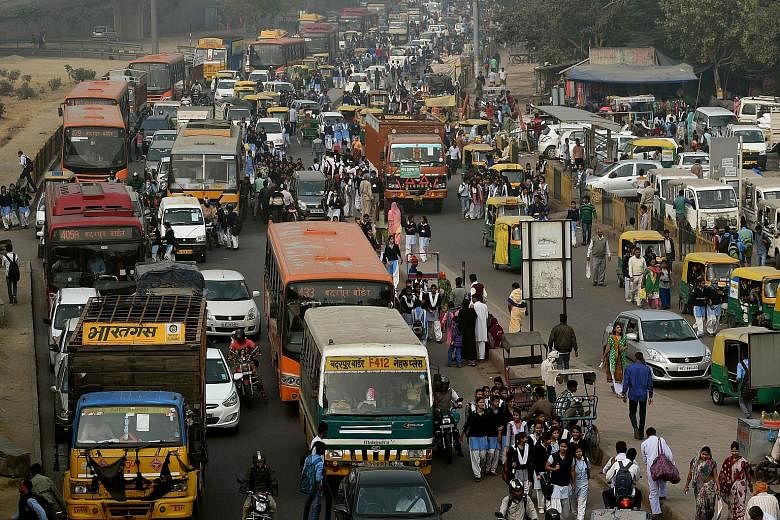The Delhi government is moving ahead with a plan to curb cars on the roads of the capital, which has been covered in a thick blanket of smog on several days since last month.
Delhi Chief Minister Arvind Kejriwal yesterday met federal Home Minister Rajnath Singh to firm up an odd-even licence plate car ban scheme to be launched on Jan 1.
According to the plan, private cars will be allowed on the roads on alternate days, depending on whether the last digit on their licence plate is even or odd. The rule will apply from 8am to 8pm, except on Sundays, for two weeks.
Mr Kejriwal said yesterday that the government was considering an exemption for women travelling alone in the city and for emergencies. He also announced that there was a plan to install CCTVs to monitor traffic across the city.
Volunteers and police officials will help to enforce the ban, with air quality to be monitored at 200 locations to see if the ban, initially on a trial basis, would be effective.
"I know it will be hard, but to reduce pollution, we have to suffer a little," said Mr Kejriwal in an advertisement that started airing on radio this week. "If it is too much trouble, then we will stop it. For 15 days, car pool with friends and neighbours. I will also do it."
India's capital - with a population of 16 million people - is the world's most polluted city, according to the World Health Organisation. The city adds 1,400 new cars every day. The Delhi High Court noted that Delhi is becoming "like a gas chamber" as air pollution levels were a dozen times over the permissible limit in many places.
Sill the ban has got residents worried as the city's transport system remains overcrowded.
"People are thinking it will not be implemented and that they will deal with it when it happens. We are lucky we have cars with odd and even licence plates," said Ms Alika Dayal, a teacher.
The Delhi Metro and bus corporation have said they would have trouble increasing services on such short notice. Still, experts said the city needed such measures to control the volume of cars on the road.
"We are supporting this as an emergency action... We are hoping that if they focus on implementing it well, it will create a template that can be used on a longer-term basis and catalyse reform of public transport," said Ms Anumita Roy Chowdhury, executive director of the Centre for Science and Environment.
But Mr S. Sundar, a distinguished fellow at The Energy and Resources Institute, said it was still not enough.
"Other demand management measures like congestion pricing, hike in parking charges and low emission zones are also necessary. And we should give urgent thought to reducing the rate of growth of new cars in Delhi as Singapore and Hong Kong have done," he suggested.

